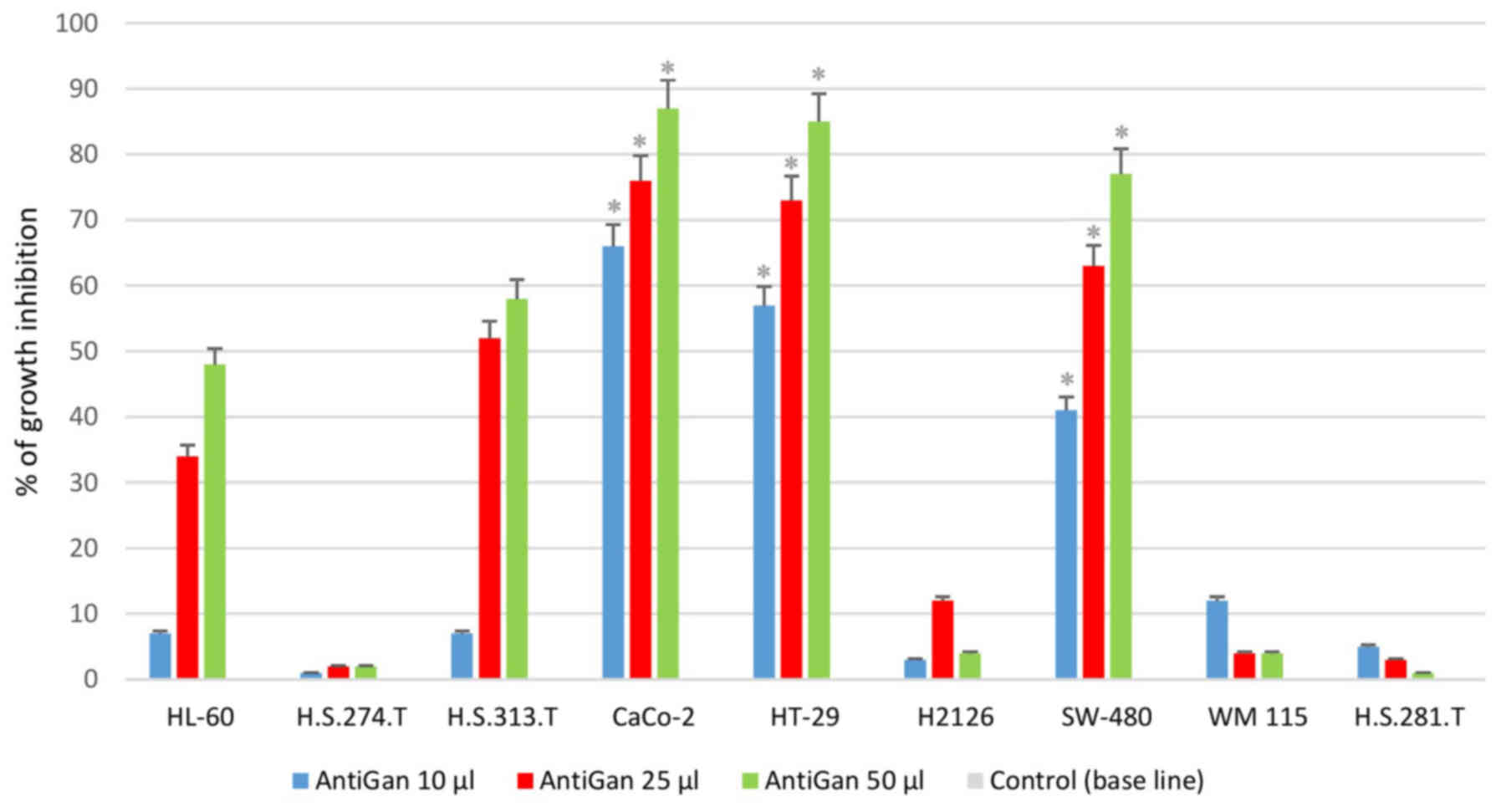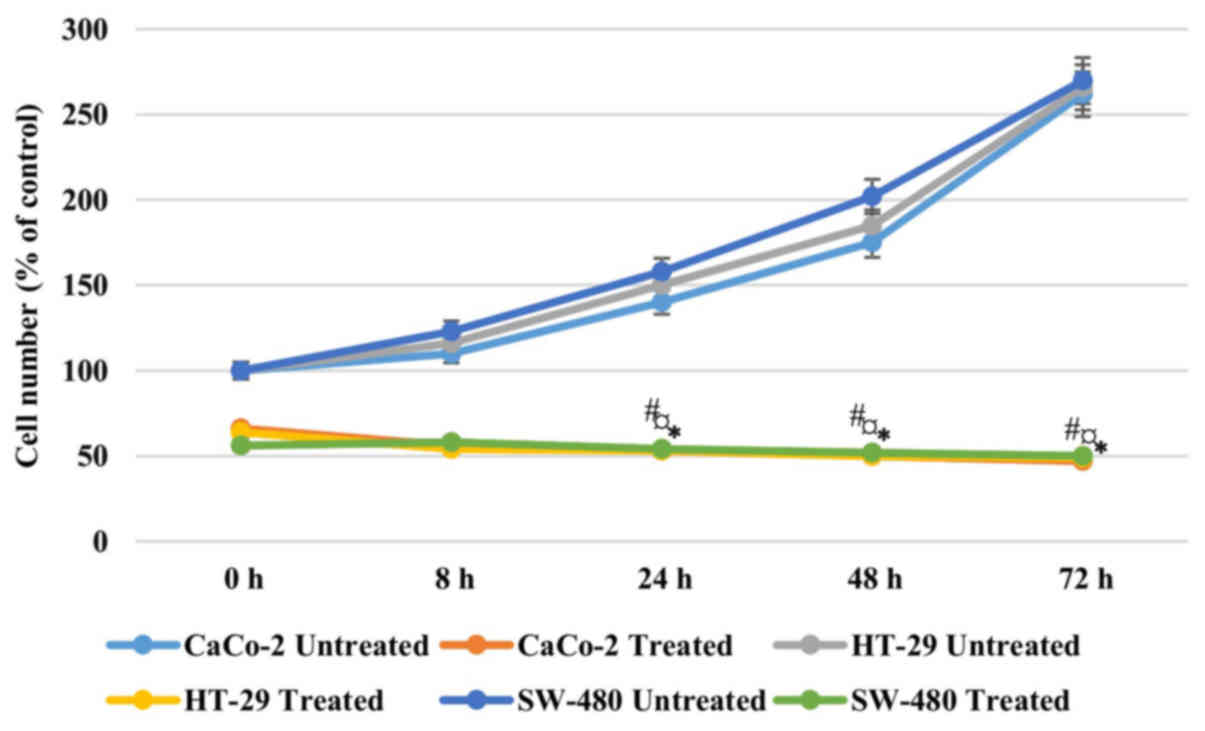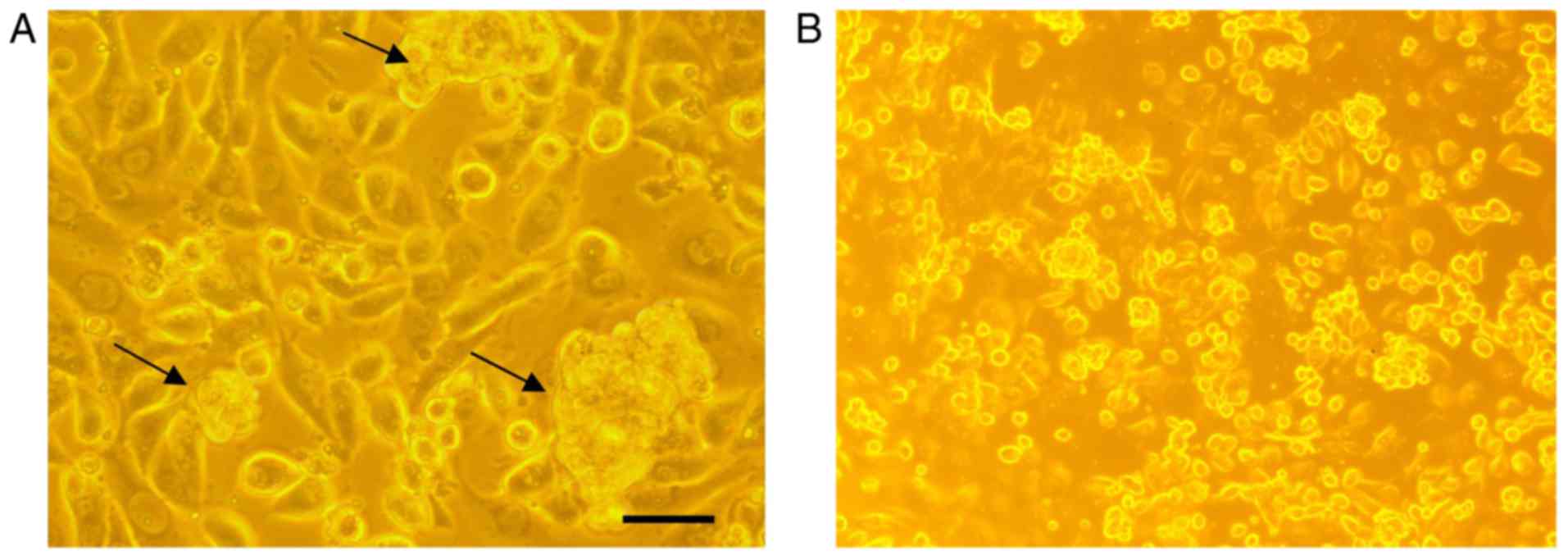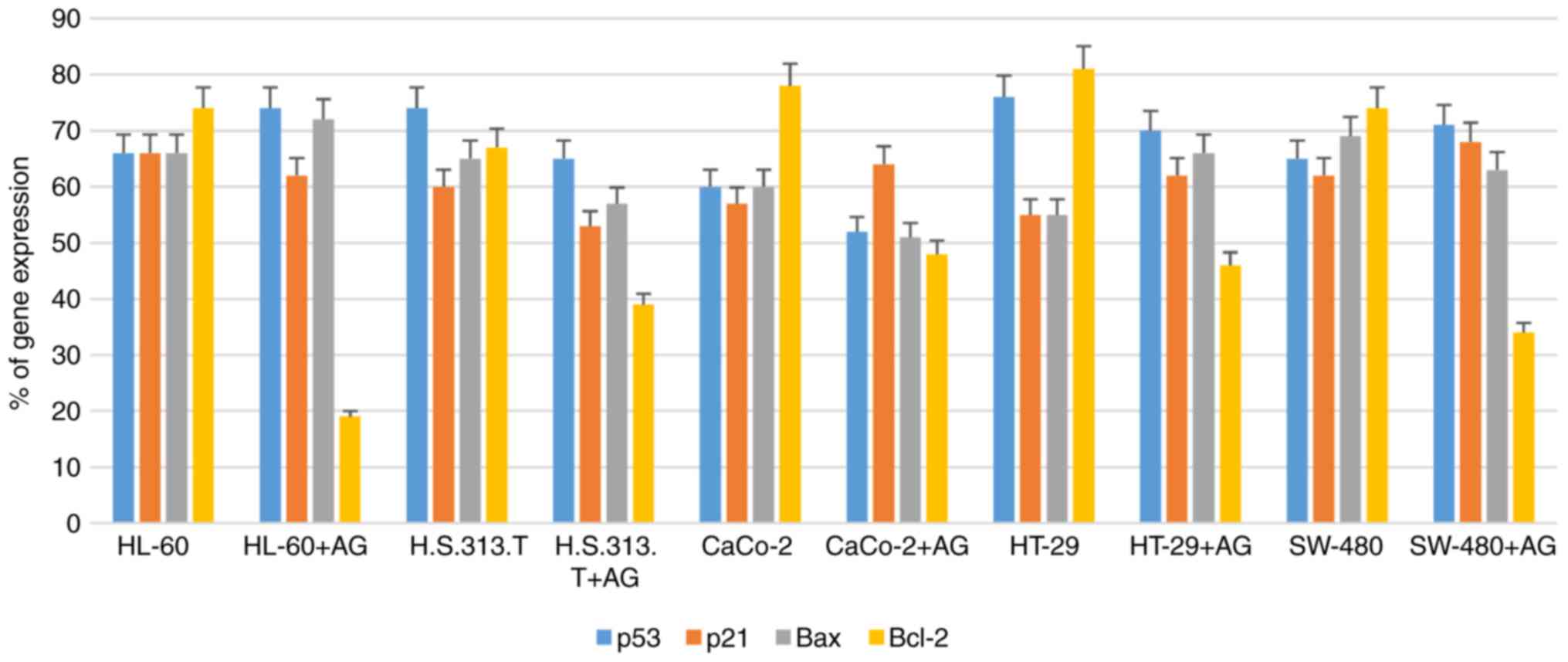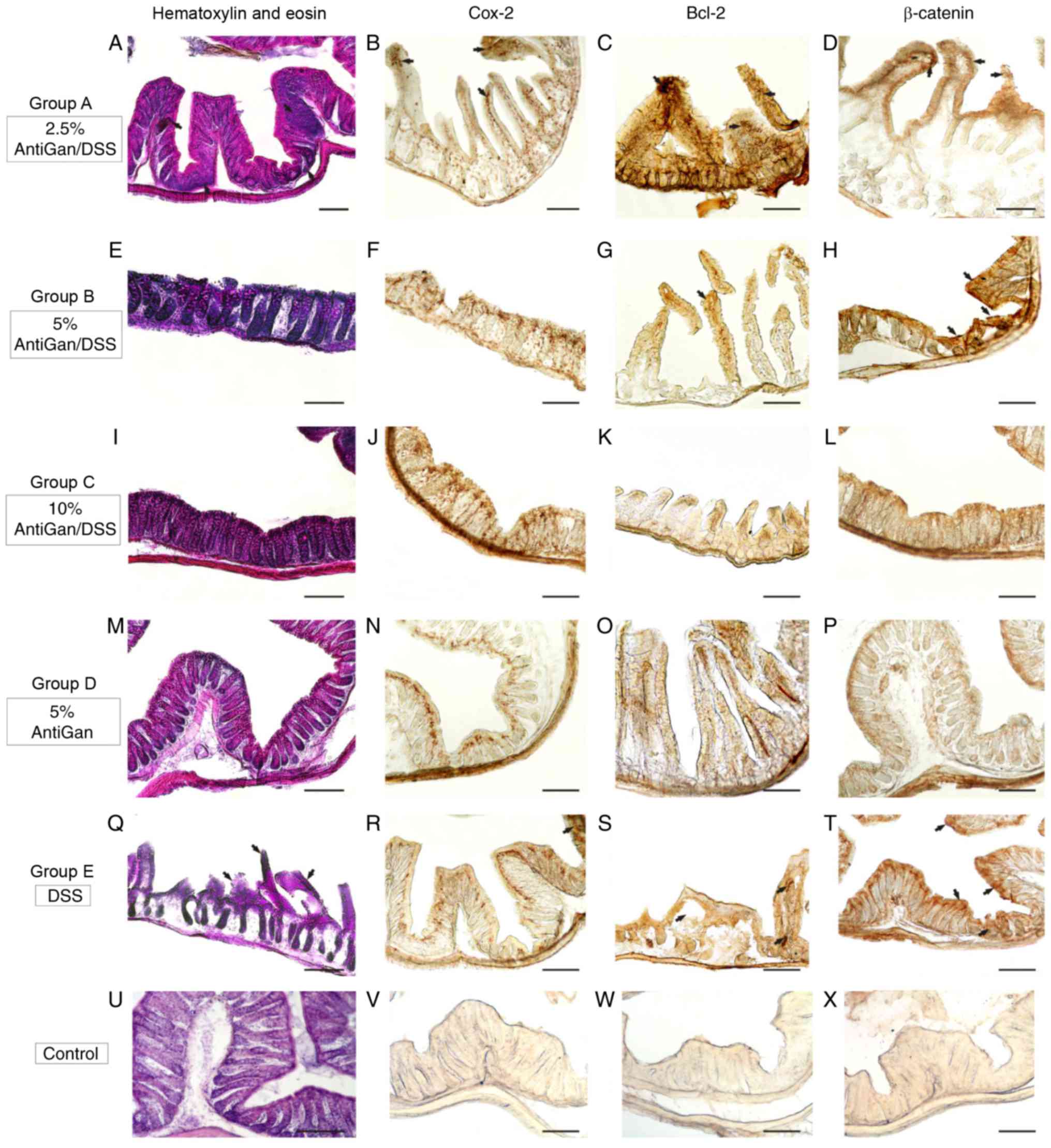|
1
|
Eckhardt S: Recent progress in the
development of anticancer agents. Curr Med Chem Anticancer Agents.
2:419–439. 2002. View Article : Google Scholar : PubMed/NCBI
|
|
2
|
Medina D, Sivaraman L, Hilsenbeck SG,
Conneely O, Ginger M, Rosen J and Omalle BW: Mechanisms of hormonal
prevention of breast cancer. Ann N Y Acad Sci. 952:23–35. 2001.
View Article : Google Scholar : PubMed/NCBI
|
|
3
|
Muller E, Gasparutto D and Cadet J:
Chemical synthesis and biochemical properties of oligonucleotides
that contain the
(5′S,5S,6S)-5′,6-cyclo-5-hydroxy-5,6-dihydro-2′-deoxyuridine DNA
lesion. Chembiochem. 3:534–542. 2002. View Article : Google Scholar : PubMed/NCBI
|
|
4
|
Song Y, Wu F and Wu J: Targeting histone
methylation for cancer therapy: Enzymes, inhibitors, biological
activity and perspectives. J Hematol Oncol. 9:492016. View Article : Google Scholar : PubMed/NCBI
|
|
5
|
Gregory RK, Hill ME, Moore J, A'Hern RP,
Johnston SR, Blake P, Shephard J, Barton D and Gore ME: Combining
platinum, paclitaxel and anthracycline in patients with advanced
gynaecological malignancy. Eur J Cancer. 36:503–507. 2000.
View Article : Google Scholar : PubMed/NCBI
|
|
6
|
Spielmann M, Llombart A, Zelek L, Sverdlin
R, Rixe O and Le Cesne A: Docetaxel-cisplatin combination (DC)
chemotherapy in patients with anthracycline-resistant advanced
breast cancer. Ann Oncol. 10:1457–1460. 1999. View Article : Google Scholar : PubMed/NCBI
|
|
7
|
Jelliffe AM: Vinblastine in the treatment
of Hodgkin's disease. Br J Cancer. 23:44–48. 1969. View Article : Google Scholar : PubMed/NCBI
|
|
8
|
Lech G, Słotwiński R, Słodkowski M and
Krasnodębski IW: Colorectal cancer tumour markers and biomarkers:
Recent therapeutic advances. World J Gastroenterol. 22:1745–1755.
2016. View Article : Google Scholar : PubMed/NCBI
|
|
9
|
Spiegelberg D, Stenberg J, Haylock AK and
Nestor M: A real-time in vitro assay as a potential predictor of in
vivo tumor imaging properties. Nucl Med Biol. 43:12–18. 2016.
View Article : Google Scholar : PubMed/NCBI
|
|
10
|
Wolff AC: Systemic therapy. Curr Opin
Oncol. 11:468–474. 1999. View Article : Google Scholar : PubMed/NCBI
|
|
11
|
Gobbo OL, Sjaastad K, Radomski MW, Volkov
Y and Prina-Mello A: Magnetic nanoparticles in cancer theranostics.
Theranostics. 5:1249–1263. 2015. View Article : Google Scholar : PubMed/NCBI
|
|
12
|
de Campos-Lobato LF, Geisler DP, da Luz
Moreira A, Stocchi L, Dietz D and Kalady MF: Neoadjuvant therapy
for rectal cancer: The impact of longer interval between
chemoradiation and surgery. J Gastrointest Surg. 15:444–450. 2011.
View Article : Google Scholar : PubMed/NCBI
|
|
13
|
Bechis SK, Carroll PR and Cooperberg MR:
Impact of age at diagnosis on prostate cancer treatment and
survival. J Clin Oncol. 29:235–241. 2011. View Article : Google Scholar : PubMed/NCBI
|
|
14
|
Krug U, Röllig C, Koschmieder A, Heinecke
A, Sauerland MC, Schaich M, Thiede C, Kramer M, Braess J,
Spiekermann K, et al: Complete remission and early death after
intensive chemotherapy in patients aged 60 years or older with
acute myeloid leukaemia: A web-based application for prediction of
outcomes. Lancet. 376:2000–2008. 2010. View Article : Google Scholar : PubMed/NCBI
|
|
15
|
Berz D and Wanebo H: Targeting the growth
factors and angiogenesis pathways: Small molecules in solid tumors.
J Surg Oncol. 103:574–586. 2011. View Article : Google Scholar : PubMed/NCBI
|
|
16
|
Jeong JK, Moon MH, Seo JS, Seol JW, Lee YJ
and Park SY: Sulforaphane blocks hypoxia-mediated resistance to
TRAIL-induced tumor cell death. Mol Med Rep. 4:325–330.
2011.PubMed/NCBI
|
|
17
|
Villanueva A and Llovet JM: Targeted
therapies for hepatocellular carcinoma. Gastroenterology.
140:1410–1426. 2011. View Article : Google Scholar : PubMed/NCBI
|
|
18
|
Kline J and Gajewski TF: Clinical
development of mAbs to block the PD1 pathway as an immunotherapy
for cancer. Curr Opin Investig Drugs. 11:1354–1359. 2010.PubMed/NCBI
|
|
19
|
Goldman A: Tailoring combinatorial cancer
therapies to target the origins of adaptive resistance. Mol Cell
Oncol. 3:e10305342015. View Article : Google Scholar : PubMed/NCBI
|
|
20
|
Brett-Morris A, Mislmani M and Welford SM:
SAT1 and glioblastoma multiforme: Disarming the resistance. Mol
Cell Oncol. 2:e9833932015. View Article : Google Scholar : PubMed/NCBI
|
|
21
|
Bustany S, Bourgeais J, Tchakarska G, Body
S, Hérault O, Gouilleux F and Sola B: Cyclin D1 unbalances the
redox status controlling cell adhesion, migration, and drug
resistance in myeloma cells. Oncotarget. 7:45214–45224. 2016.
View Article : Google Scholar : PubMed/NCBI
|
|
22
|
Nakamura O, Inaga Y, Suzuki S, Tsutsui S,
Muramoto K, Kamiya H and Watanabe T: Possible immune functions of
congerin, a mucosal galectin, in the intestinal lumen of Japanese
conger eel. Fish Shellfish Immunol. 23:683–692. 2007. View Article : Google Scholar : PubMed/NCBI
|
|
23
|
Faul F, Erdfelder E, Lang AG and Buchner
A: G*Power 3: A flexible statistical power analysis program for the
social, behavioral, and biomedical sciences. Behav Res Methods.
39:175–191. 2007. View Article : Google Scholar : PubMed/NCBI
|
|
24
|
Huflejt ME and Leffler H: Galectin-4 in
normal tissues and cancer. Glycoconj J. 20:247–255. 2004.
View Article : Google Scholar : PubMed/NCBI
|
|
25
|
Yalon M, Tuval-Kochen L, Castel D, Moshe
I, Mazal I, Cohen O, Avivi C, Rosenblatt K, Aviel-Ronen S, Schiby
G, et al: Overcoming resistance of cancer cells to PARP-1
inhibitors with three different drug combinations. PLoS One.
11:e01557112016. View Article : Google Scholar : PubMed/NCBI
|
|
26
|
Perše M and Cerar A: Morphological and
molecular alterations in 1,2 dimethylhydrazine and azoxymethane
induced colon carcinogenesis in rats. J Biomed Biotechnol.
2011:4739642011. View Article : Google Scholar : PubMed/NCBI
|
|
27
|
Lombardi VR, Etcheverría I, Carrera I,
Cacabelos R and Chacón AR: Prevention of chronic experimental
colitis induced by dextran sulphate sodium (DSS) in mice treated
with FR91. J Biomed Biotechnol. 2012:8261782012. View Article : Google Scholar : PubMed/NCBI
|
|
28
|
Barbuti AM and Chen ZS: Paclitaxel through
the ages of anticancer therapy: Exploring its role in
chemoresistance and radiation therapy. Cancers (Basel).
7:2360–2371. 2015. View Article : Google Scholar : PubMed/NCBI
|
|
29
|
Shindikar A, Singh A, Nobre M and
Kirolikar S: Curcumin and resveratrol as promising natural remedies
with nanomedicine approach for the effective treatment of triple
negative breast cancer. J Oncol. 2016:97507852016. View Article : Google Scholar : PubMed/NCBI
|
|
30
|
Orfali GD, Duarte AC, Bonadio V, Martinez
NP, de Araújo ME, Priviero FB, Carvalho PO and Priolli DG: Review
of anticancer mechanisms of isoquercitin. World J Clin Oncol.
7:189–199. 2016. View Article : Google Scholar : PubMed/NCBI
|
|
31
|
Lall RK, Adhami VM and Mukhtar H: Dietary
flavonoid fisetin for cancer prevention and treatment. Mol Nutr
Food Res. 60:1396–1405. 2016. View Article : Google Scholar : PubMed/NCBI
|
|
32
|
Ediriweera MK, Tennekoon KH, Samarakoon
SR, Thabrew I and Dilip DE Silva E: A study of the potential
anticancer activity of Mangifera zeylanica bark: Evaluation of
cytotoxic and apoptotic effects of the hexane extract and
bioassay-guided fractionation to identify phytochemical
constituents. Oncol Lett. 11:1335–1344. 2016. View Article : Google Scholar : PubMed/NCBI
|
|
33
|
Martínez-Pérez C, Ward C, Turnbull AK,
Mullen P, Cook G, Meehan J, Jarman EJ, Thomson PI, Campbell CJ,
McPhail D, et al: Antitumour activity of the novel flavonoid
Oncamex in preclinical breast cancer models. Br J Cancer.
114:905–916. 2016. View Article : Google Scholar : PubMed/NCBI
|
|
34
|
Czyżewska U, Siemionow K, Zaręba I and
Miltyk W: Proapoptotic activity of propolis and their components on
human tongue squamous cell carcinoma cell line (CAL-27). PLoS One.
11:e01570912016. View Article : Google Scholar : PubMed/NCBI
|
|
35
|
Spilioti E, Jaakkola M, Tolonen T,
Lipponen M, Virtanen V, Chinou I, Kassi E, Karabournioti S and
Moutsatsou P: Phenolic acid composition, antiatherogenic and
anticancer potential of honeys derived from various regions in
Greece. PLoS One. 9:e948602014. View Article : Google Scholar : PubMed/NCBI
|
|
36
|
Giovannini C and Masella R: Role of
polyphenols in cell death control. Nutr Neurosci. 15:134–149. 2012.
View Article : Google Scholar : PubMed/NCBI
|
|
37
|
Fu J, Dang Z, Deng Y and Lu G: Regulation
of c-Myc and Bcl-2 induced apoptosis of human bronchial epithelial
cells by zinc oxide nanoparticles. J Biomed Nanotechnol. 8:669–675.
2012. View Article : Google Scholar : PubMed/NCBI
|
|
38
|
Cho JY, Chang HJ, Lee SK, Kim HJ, Hwang JK
and Chun HS: Amelioration of dextran sulfate sodium-induced colitis
in mice by oral administration of beta-caryophyllene, a
sesquiterpene. Life Sci. 80:932–939. 2007. View Article : Google Scholar : PubMed/NCBI
|
|
39
|
Araki Y, Mukaisyo K, Sugihara H, Fujiyama
Y and Hattori T: Increased apoptosis and decreased proliferation of
colonic epithelium in dextran sulfate sodium-induced colitis in
mice. Oncol Rep. 24:869–874. 2010. View Article : Google Scholar : PubMed/NCBI
|
|
40
|
Huang TC, Tsai SS, Liu LF, Liu YL, Liu HJ
and Chuang KP: Effect of Arctium lappa L. in the dextran sulfate
sodium colitis mouse model. World J Gastroenterol. 16:4193–4199.
2010. View Article : Google Scholar : PubMed/NCBI
|
|
41
|
Choi SY, Hur SJ, An CS, Jeon YH, Jeoung
YJ, Bak JP and Lim BO: Anti-inflammatory effects of inonotus
obliquus in colitis induced by dextran sodium sulfate. J Biomed
Biotechnol. 2010:9435162010. View Article : Google Scholar : PubMed/NCBI
|
|
42
|
Whittem CG, Williams AD and Williams CS:
Murine colitis modeling using dextran sulfate sodium (DSS). J Vis
Exp. 19:pii: 16522010.
|
|
43
|
Slattery ML, Curtin KP, Edwards SL and
Schaffer DM: Plant foods, fiber, and rectal cancer. Am J Clin Nutr.
79:274–281. 2004.PubMed/NCBI
|
|
44
|
Okayasu I, Hana K, Nemoto N, Yoshida T,
Saegusa M, Yokota-Nakatsuma A, Song SY and Iwata M: Vitamin A
inhibits development of dextran sulfate sodium-induced colitis and
colon cancer in a mouse model. Biomed Res Int. 2016:48748092016.
View Article : Google Scholar : PubMed/NCBI
|
|
45
|
Miner-Williams WM and Moughan PJ:
Intestinal barrier dysfunction: Implications for chronic
inflammatory conditions of the bowel. Nutr Res Rev. 29:40–59. 2016.
View Article : Google Scholar : PubMed/NCBI
|
|
46
|
Wang JG, Wang DF, Lv BJ and Si JM: A novel
mouse model for colitis-associated colon carcinogenesis induced by
1,2-dimethylhydrazine and dextran sulfate sodium. World J
Gastroenterol. 10:2958–2962. 2004. View Article : Google Scholar : PubMed/NCBI
|
|
47
|
Liu Z, Feng BS, Yang SB, Chen X, Su J and
Yang PC: Interleukin (IL)-23 suppresses IL-10 in inflammatory bowel
disease. J Biol Chem. 287:3591–3597. 2012. View Article : Google Scholar : PubMed/NCBI
|















